
Martha Wirth Photography

Audio By Carbonatix
The incarceration of Japanese Americans during World War II isn’t a common topic in Hollywood movies, and is rarely covered in best-selling books. It’s barely been spotlighted on stage, either, with the notable exception of George Takei’s musical Allegiance, currently being produced in London.
But late last year, an independently produced play took over a suite of empty office spaces in Sakura Square, the downtown hub for Denver’s Japanese American community, and introduced audiences to the Japanese American experience. Zotto promised “an immersive and multi-sensory supernatural Japanese folktale and theatrical journey,” and it delivered a top-notch production with its independent local pedigree. After a sold-out run from November through December last year, the play returned for an encore in March, and is now back again.
The producers’ backgrounds and the play’s narrative is deeply rooted in Japanese American history and culture. Zotto, pronounced zohtt toh, means “shiver” or “shudder” in Japanese. The play leads small groups of audience members through an interactive experience that unfolds a narrative like a complex origami artwork, covering three generations of Japanese American women and the trauma passed down through the decades since World War II. In 1942, more than 110,000 people of Japanese descent – with more than half being American citizens by birth – were forced into concentration camps during the war. Families who lived on the West Coast lost homes, farms and businesses, and ultimately had to rebuild their lives. Many came to Denver.

Each set is immaculately designed.
Martha Wirth Photography
The story is told in a series of interactions with the three women and with yokai, traditional Japanese spirits or ghosts. The audience members are first led into the reception room of the character Dr. Kitsu, and after the doctor’s office, a kappa – a playful, frog-like reptilian spirit – guides them through various sets, from the family’s concentration camp barrack room they lived in, to the post-war grocery store they owned. In each set, audience members learn more about the Japanese American experience and how it damaged the grandmother of the family, while following the granddaughter’s journey to learn what happened.
From room to room, the narrative is emotionally gripping, whether the viewer knows the history or not. The script is based on the fictionalized family experience of Courtney Ozaki, the writer, creative producer and artistic director of the play. She wanted to create a story that would leave people contemplating their own relationship to their families’ past and make them ponder what kind of ancestor they’d like to be for their descendants.
“There’s so much that’s been untold to our generations as far as…how these experiences affected our families and loved ones,” says Ozaki. “There’s just so much unspoken trauma that gets carried down, without any sort of addressing it. But then there’s also a lot of things that sometimes we take for granted, about the cultural joy that has been a reality for us for our whole lives, too.”
She recalls a story that her grandmother told her about her family, who were assigned to live in a horse stall at a race track in Los Angeles before being sent to the Poston camp in Arizona. “The very first time she ever talked to me about her experience during the war,” Ozaki says, “was her telling me about cleaning out their own horse stalls, and I was shocked, completely aghast about it. But she said so nonchalantly, ‘Oh, yeah, we cleaned out our own horse stall.’
“So part of it was their story. Part of it was having conversations with so many other people who had incarceration histories,” Ozaki explains of the influence for the production. She conducted interviews for a Stories of Solidarity project and, she says, “I learned more about, for example, what it was like to come to Denver directly after the war, and to live at the Burlington hotel. So [Zotto] incorporates a lot of different people’s stories.”

The play follows a young woman uncovering generational trauma.
Martha Wirth Photography
There’s also a theme of roses running through the play. People entering Dr. Kitsu’s office at the start are given a rose, and rose petals appear in various sets. They represent the roses that bloomed at the southeastern Colorado concentration camp, Amache. Planted by prisoners during the war despite the inhospitable soil, a rose bush was miraculously found blooming last year by a DU archaeology team, and the Denver Botanic Gardens has produced a documentary about it titled Amache Rose.
Like the untold story of the roses at Amache, Zotto digs into stories uncovered by a young woman searching for the cause of her family’s generational sadness and trauma while learning more about the incarceration and the racism her family faced even after resettling in Denver. There are local references to Denver’s Japanese American community that will resonate with any longtime community members, although those references will also be familiar to non-Japanese, helping to make sense of the history while providing richer context for the present.
Ozaki says she wants audiences to “consider their own role in society and in this world, and to better understand the place that they’re from and the histories here and how those have all impacted Denver, and to consider their role in history moving forward. What do they want? What kind of impact did they want to have?”
Ozaki is also busy with her company, Japanese Arts Network. She recently produced a dance piece that premiered in San Jose, and served as general manager of an opera, A Marvelous Order, which debuted premiered at Penn State last fall; she also recently organized an Asian Night Market at History Colorado, where she curated Rice & Resilience, an exhibit about the history of Asian food in Colorado, last year.
Like the national projects with which she’s involved, Ozaki hopes Zotto can have an impact outside of Denver; with more funding, the play can travel to other cities. With everything she’s doing, Ozaki deserves to become rich, or she’ll burn out.
“Well, I’m already burnt out,” she laughs. “And I’m very poor. So hopefully, I’ll become rich.”
Zotto makes another encore run from Thursday, July 6, to Sunday, July 30, at Sakura Square, 1905 Lawrence Street, on the mezzanine level. Tickets are $75; get them here.